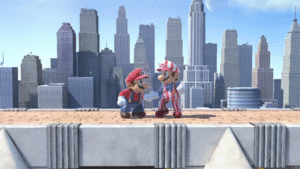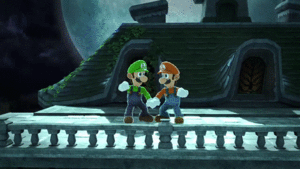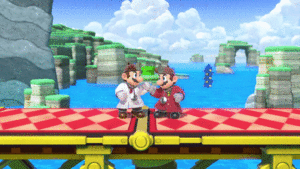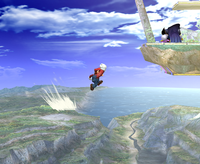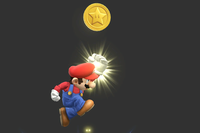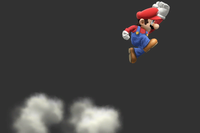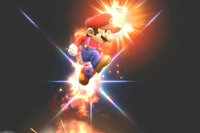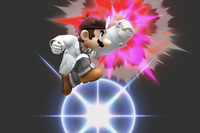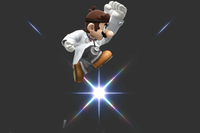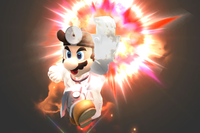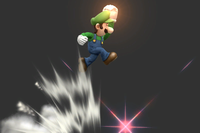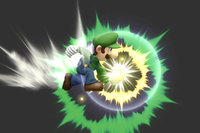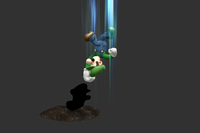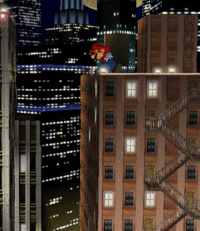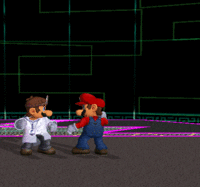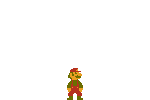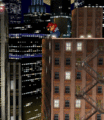Super Jump Punch
| Super Jump Punch | |
|---|---|
Super Jump Punch in Ultimate. | |
| Users | Mario Luigi Dr. Mario |
| Universe | Mario |
| Article on Super Mario Wiki | Jump |
The Super Jump Punch (スーパージャンプパンチ, Super Jump Punch) is Mario, Dr. Mario, and Luigi's up special move in each of their appearances in the Super Smash Bros. series.
Overview[edit]
Super Jump Punch is a move where the user leaps vertically while performing an uppercut. This is the user's main recovery move, and it can also be used out of shield.
Mario[edit]
When performed by Mario, he jumps diagonally upwards with a more vertical range than horizontal. If the attack strikes an enemy during the jump, coins fly out of the enemy, and the foe receives several hits. The coins' appearance is accompanied by the usual sound effect played in the Mario series when Mario grabs a coin. It is possible to "aim" the move tilting the control stick during the initial "spark" of the move's animation, with the further forward the tilt, the more horizontal but less vertical range. Tilting in the opposite direction during the move's start-up will cause Mario jump backwards and, prior to Ultimate, hit opponents with the first hit of the move, which only does set knockback and minimal damage, therefore having little use.
In the original Super Smash Bros., the move has a great vertical range (enough to go from the main platform of Dream Land to the top platform) and decent horizontal range if it is aimed forward. The starting hit deals 5%, the seven rising hits deal 1% each, and the final hit deals 3%, dealing up to 15% in theory but 14% due to the last hit becoming stale.
From Super Smash Bros. Melee onward, this range was reduced, causing it to become an overall rather poor recovery move since it is easily edgeguarded. However, he can utilize his side special, wall jump, and respective down specials to mitigate this nerf (although the latter was noticeably nerfed). The damage values are unchanged, but changes to staling result in it dealing overall less damage, reaching up to 12%. It can cancel itself into a wall upon startup, making it better for recovery mix-ups. This version is also one frame slower than the previous version, coming out on frame 3 as opposed to frame 2. This makes it a slightly worse out of shield option although it is still tied for the fastest (and Mario generally has many more opportunities to use it out of shield due to the changes to shieldstun).
In Super Smash Bros. Brawl, the move has lost the ability to cancel itself into a wall, but the last hit has increased knockback, rendering it capable of KOing at the upper blast line. The move also possesses two fewer hits and the autolink angle on the penultimate hits, allowing it to connect more reliably. While changes to staling allow the move's multihits to deal their full damage, the fewer hits result in it still dealing 12%. The move can also be performed one frame faster out of shield, as (with all up specials) it can now be performed on the first frame of Mario's jumpsquat rather than the second frame. Holding backwards on the control stick after the initial "spark" now allows Mario to go slightly higher with less horizontal movement.
In Super Smash Bros. 4, the move travels a slightly better vertical distance and no longer causes him to drop momentum at the move's apex, compensating for the nerf to Cape's stalling effect, and is often used for a combo finisher after several up aerials. The move's hitboxes are identical to its Brawl counterpart however, the move greatly benefits from the universal changes to Smash 4, mainly the removal of edgehogging and the introduction of rage. The former (along with its increased distance) makes it a much better recovery move while the latter can potentially allow the move to KO as low as 0% near the upper blastzone if Mario has enough rage.
In Super Smash Bros. Ultimate, there is a 30% chance that Cappy from Super Mario Odyssey might show his eyes when Mario uses this move, with the coin sound effect altered, and the coins replaced with regional coins from New Donk City should this occur; this is purely aesthetic, and has no effect on the move's properties. The linking hits deal less damage (1% → 0.6%) and the final hit deals less base knockback, hindering the move's damage-racking (up to 11.0% total) and vertical KOing ability, while the move sweet spots the ledge three frames later, worsening its utility as a recovery move. The changes to rage also removed the looping hits' ability to KO at incredibly early percents. However, the linking hits now use weight-independent knockback and are impossible to SDI, making the move connect even more reliably, and several of them (specifically the second to fourth hits of the entire move) have a larger gap between each other, increasing the move's total hitbox duration. In addition, the move now travels high enough to reach the top platform of Dream Land for the first time since Smash 64 (though this is brought about by a change to Dream Land rather than one to the move itself).
Luigi[edit]
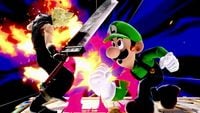
Luigi's version of the move behaves very differently from both Mario and Dr. Mario's versions. The move has a rather large sourspot that deals only 1% damage (releasing a single coin) and no knockback, barely making an opponent flinch at all. However, it has a very precise sweetspot right in front of Luigi only at the very beginning of the move, which if it connects turns the move into a powerful Fire Jump Punch that makes the ping sound effect (except in the Japanese version of Smash 64, where a normal strong attack sound plays), dealing 25% damage with high knockback (enough to KO at around 60% damage or higher) and triggering Special Zoom in Ultimate. The aerial Fire Jump Punch is weaker than the grounded version, dealing 20% rather than 25% and considerably lower knockback with no ping or Special Zoom. (Starting from Smash 4, the aerial sweetspot has less startup lag and a somewhat larger hitbox to minimally compensate.) It is possible to combo with it by short hopping, performing a neutral aerial, and then using a sweet spotted punch at damage percentages around 40% with many characters. Luigi can turn around after the initial hitbox, which will sour spot anyone near him when doing so; however, the usefulness of this maneuver is questionable. Regardless, the move is Luigi's most powerful KO move, and it also serves as Luigi's primary vertical recovery move.
In the original Super Smash Bros., Luigi's Super Jump Punch sends him upwards and forwards like Mario, but the horizontal movement after the move is performed is low. From Melee onward, to distinguish the behavior of the move even further from Mario and Dr. Mario, the move instead sends Luigi directly vertically upward with no horizontal range at all, gaining less height compared to Smash 64 and losing the ability to be angled. In Melee, specifically, Luigi would fall straight down after he finished rising, forcing him to rely entirely on his then-newly added Green Missile and his Luigi Cyclone for horizontal recovery. The move also received increased startup lag and reduced knockback in Melee. From Brawl onward, for comedic and aesthetic effect Luigi falls upside-down after performing the move, becoming helpless; this allows him to steer himself horizontally while falling at the cost of more landing lag, unlike the old helpless state. In Brawl, the sweet spot has slightly increased startup lag but is more effective at KOing due to the universally decreased falling speeds combined with the inclusion of the gravity penalty. It covers considerably greater vertical distance than Mario's and Dr. Mario's respective versions in all games except Smash 4. It gains even less distance than before in Smash 4, with even more landing lag, and it has less KO power due to its reduced knockback. The grounded version also has more startup lag and less range. It is somewhat safer, however, due to its reduced distance. However, in Ultimate most of the move's height and KO power from Brawl was restored, albeit with reduced horizontal movement when Luigi starts descending. The move also KO confirms from many of Luigi's moves, including his down throw, up tilt, and neutral aerial.
The move's sour spot may seem useless; however, in Time matches it can be used to steal KOs, as it will give Luigi the last hit on the opponent without changing their trajectory. Additionally, in Melee and Ultimate, the Luigi Ladder can be performed, where two Luigis can repeatedly hit each other with the sour spot of the attack to rise indefinitely, even above the upper blast line.
Dr. Mario[edit]
In Melee, Dr. Mario's version of the attack is nearly identical to Mario's, though it deals more knockback and scores fewer hits. As with Mario, if the attack hits an enemy, coins fly out and the attack deals about 13% damage fresh. However, the sound effect uses generic "hit" sounds instead of playing Mario's usual coin sound effect. Like Mario, Dr. Mario can also "aim" the move to change its angle somewhat, which notably initiates faster than with Mario's version. This move can be canceled upon startup unlike Mario's, granting it combo ability, but it cannot be canceled into a wall jump since Dr. Mario cannot wall jump. It also travels less recovery distance than Mario's, forcing Dr. Mario to rely more on his respective side and down specials compared to Mario, both of which also grant less momentum than Mario's.
In SSB4, Dr. Mario's Super Jump Punch no longer hits multiple times and coins no longer fly out, now striking as a sex kick, dealing 13.44% damage at the start of the attack and 6.72% damage for the rest of the move. This can be considered a less extreme version of Luigi's version of Super Jump Punch. This move, if hit clean and aimed in the opposite direction, can potentially hit foes behind him, allowing him to avoid a possible punish after using the move or edgeguard foes offstage and recover at the same time, somewhat compensating for the removal of its cancelling technique. The move gains a significant landing lag nerf, similar to Mario's and Luigi's, hindering its safety if whiffed.
In Ultimate, Dr. Mario's stronger attack multiplier causes Super Jump Punch to be even stronger, now dealing 14.1% clean and 7.0% late without any compensation on its knockback. However, it has lost the ability to be aimed after connecting with the sweet spot, removing its edgeguarding potential.
Customization[edit]
Special Move customization is available in Super Smash Bros. 4. These are the variations:
Mario and Dr. Mario[edit]
- Super Jump Punch: Default.
- Super Jump: Deals no damage, but has less startup, increases the distance traveled, and has a wider range of angles, essentially looking like Mario's iconic jump. Rises faster when used in mid-air. While Mario's Super Jump further increases recovery distance (about to Smash 64 levels), Dr. Mario's Super Jump travels about the same distance as Mario's Super Jump Punch. It has significantly more ending lag and slightly more landing lag, but Mario's momentum is not halted at the end of the move as much.
- Explosive Punch (Mario) / Ol' One-Two (Dr. Mario) (known as The Ol' One-Two (Dr. Mario) in the PAL version): Produces flame and explosive damage. It now does only two hits, 8% damage for the first hit and 13% damage for the second. A powerful KOing option, killing at around 96% from the ground. However, recovery distance is reduced, and the move can't be angled at all. The move has drastically increased ending lag, meaning Mario cannot be controlled for a long time after the move ends, and it also has slightly increased landing lag. However, it has significantly larger hitboxes, making it somewhat easier to connect with.
- In Super Smash Bros. for Nintendo 3DS, this variation is a Challenge unlock for Mario, only obtainable by getting a score of at least 200,000 in Target Blast.
Luigi[edit]
- Super Jump Punch: Default.
- Fiery Jump Punch: The sweet spot is much larger (2.2 -> 4.0 (ground) 2.7 -> 4.0 (air)), making it considerably easier to land. However it is weaker (25% (ground), 20% (air) -> 18% (ground), 15% (air)), has a worse angle (88º (ground), 90º (Air) -> 70º (ground), 75º air), kills over 40% later, grants less height and has more ending and landing lag. Oddly, it grants Luigi slight control of the angle of the jump, granting it horizontal recovery potential. This is not to be confused with the Fire Jump Punch, which is the regular Super Jump Punch hit at its sweet spot, although the two are related, having to do with the sweet spot of the original attack.
- Burial Header: Loses the sweet spot but gains a new attack after the initial jump - Luigi falls much faster and can bury grounded opponents, allowing for potential follow-ups. With good positioning, the sour spot can combo into the descending hit and knock opponents away. Sends Luigi higher than his other up specials. It also has noticeably less ending lag. Hurts horizontal recovery due to the new fall speed. It also launches aerial opponents horizontally, though one might assume it is a meteor smash due to burying grounded opponents.
Mario using the Super Jump in Super Smash Bros. for Nintendo 3DS
Mario using the Explosive Punch in Super Smash Bros. for Nintendo 3DS
Instructional quotes[edit]
| Attack opponents while jumping or leap to get back to the ledge. | ||
| Smack someone with Luigi's Super Jump Punch, and if the timing is just right, it will become a Fire Jump Punch of incredible strength. However, Luigi can only jump straight up when delivering this blow, and if his aim is a bit off, he'll only do a single point of damage. | ||
| Jump while attacking. Useful in recoveries. | ||
| The Super Jump Punch is Luigi’s calling card. If you hit the opponent with it midmove, Luigi merely taps the opponent, knocking out a single coin. BUT! When you get in close and connect with the beginning of the move... PING! Luigi sends ‘em rocketing skyward! This is the Fire Jump Punch. It’s more potent on the ground than in the air, so try catching the enemy off guard with it after a quick dash or evasive roll. Sadly, Luigi’s a sitting duck when he whiffs this attack. | ||
| Jump up to hit opponents multiple times. | ||
| A rising punch that can deal great damage at the start of the move. | ||
| Hits repeatedly with a rising punch. | ||
| Punches up into the air with the strongest blows at the start of the attack. | ||
| Hits repeatedly with a rising punch that, while lacking coins, is extra powerful at the start of the jump. |
Techniques[edit]
Super Jump Punch wall jump[edit]
In Melee, if Mario is right next to a wall, the Super Jump Punch can be canceled into a wall jump by tapping the opposite direction Mario is facing immediately after Mario begins to turn around after reaching the apex of his jump. This technique can be rather useful if Mario happens to be knocked very low while next to the wall on stages such as Yoshi's Story (such as when recovering from a meteor smash). It isn't easy to utilize however, due to requiring Mario to be right next to the wall before using the move. It also doesn't work at all on certain walls.
Up-B cancel[edit]
In Melee, Dr. Mario can cancel his Super Jump Punch. To perform this, a player must have Dr. Mario use his Super Jump Punch and then during the first four frames, quickly move the control stick in the opposite direction. Alternatively, the player can use Super Jump Punch such that Dr. Mario would jump backward, and then press the control stick downward during the first few frames of the animation. This technique can be used for combos (similar to Fox's Reflector) or to shield cancel and punish the opponent for approaching or for trying to break the player's shield; however, its set knockback means that it cannot KO opponents.
The technique is still possible in Smash 4, but it requires the player to be under the effects of Witch Time or a timer.
Origin[edit]
The Super Jump Punch is based on the simplest technique used by the Mario Bros. — the jump. In the original Super Mario Bros. and many games afterward, Mario and Luigi jump to cross gaps, stomp on enemies (such as Koopa Troopas and Goombas), and break bricks or hit blocks to reveal coins or power-ups (such as Super Mushrooms and Fire Flowers).
The Super Jump Punch is based on Mario and Luigi's abilities to reveal multiple coins from certain blocks and defeat enemies standing on blocks from below by jumping due to holding their fists upward (the latter of which dates back to Mario Bros.); these coins are seen when Mario, Luigi (when sourspotted only), and Dr. Mario (in Melee only) use the attack on a foe. Coins are the currency of the Mushroom Kingdom in the Mario series. The coins that appear in the first three games borrow their design from Super Mario 64, but from Super Smash Bros. 4 onward their design was updated to resemble the Star Coins from the New Super Mario Bros. series of games. In Super Smash Bros. Ultimate, coins produced by Mario can randomly appear as regional coins found in the Metro Kingdom from Super Mario Odyssey. The sound effect played at the beginning of the move (by all three users) is based on the sound effect played when Mario or Luigi jumps in Super Mario Bros while the sound effect of the Regional coins from Odyssey plays when that variant is activated.
Gallery[edit]
Mario[edit]
Mario's Super Jump Punch on Ness in Melee.
Mario's Super Jump Punch in Super Smash Bros. for Nintendo 3DS.
Mario performing his Super Jump Punch in Super Smash Bros. for Wii U.
Super Jump Punch In Ultimate.
Luigi[edit]
Luigi's Super Jump Punch in Super Smash Bros. for Nintendo 3DS.
Luigi's Super Jump Punch in Super Smash Bros. for Wii U.
Dr. Mario[edit]
Dr. Mario's Super Jump Punch in Super Smash Bros. for Wii U.
Names in other languages[edit]
Trivia[edit]
- In Smash 4 and Ultimate, Luigi reverts to Mario's fall speed during special fall after using this move. This won't occur if he is put into special fall by Pac-Jump's trampoline.
- Although Luigi's Super Jump Punch appears to jump straight upward, it can actually be very slightly angled. This rarely has a noticeable effect though.
- In Melee, the coins for the Trophy Lottery as well as the "Game Over" screen look very similar to the coins that appear when using this move. This carries over to the Game Over screen in Brawl's Adventure and Classic Modes, as well as the Coin Launcher. Lastly, there is a Coin trophy in Melee.
- This move is occasionally nicknamed as "Pay-Day Punch", given that Nintendo Power magazine gave this name to the move in its review for Super Smash Bros., referring to the coins flying out of the enemy when dealing damage. This is a reference to the move Pay Day used by Meowth in the Pokémon games, which also causes coins to spawn.
- Prior to SSB4, the coins that appear are 2D sprites that always face the screen on the pause menu.
- In SSB4 both Explosive Punch and Ol' One Two when performed up close, bears similarities to Ryu's Shin Shoryuken.
- In Ultimate, Luigi's Super Jump Punch is coded to bypass the interruptibility that his special fall landing normally has. Causing special fall with Pac-Jump's trampoline reveals that the landing lag is supposed to be interruptible on frame 31.
- In Ultimate, the description of Dr. Mario's Super Jump Punch incorrectly states that it hits multiple times despite not being able to hit more than once since SSB4.
Technical details[edit]
Mario:
- Mario (SSB)/Up special
- Mario (SSBM)/Up special
- Mario (SSBB)/Up special
- Mario (SSB4)/Up special
- Mario (SSBU)/Up special
Luigi:
- Luigi (SSB)/Up special
- Luigi (SSBM)/Up special
- Luigi (SSBB)/Up special
- Luigi (SSB4)/Up special
- Luigi (SSBU)/Up special
Dr. Mario:
